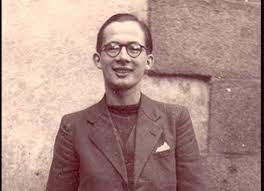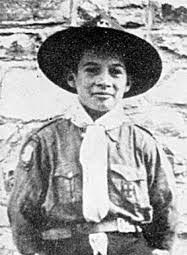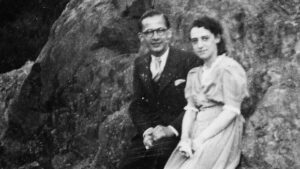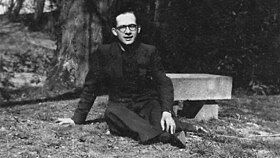
Blessed Marcel Callo was a pious French layman who was a martyr of Nazi Germany. Marcel was born in 1921 to a devout couple of modest means, Marcel Callo and his wife Felicita. Young Marcel was one of nine children and the family lived at Rennes in western France. He was educated at local schools and helped to take care of his younger siblings. He was a very devout child and became an altar server at age seven.
A NATURAL LEADER

He was a natural leader and was known to be somewhat of a perfectionist. As a youth, he especially enjoyed playing cards, soccer and ping-pong and joined the Scouts at age ten. When he was about thirteen, he became an apprentice to a printer. Also, as a teen, he became active in the J.O.C., the Christian Workers youth organization that had recently been created by Cardinal Cardijn. His apprenticeship was in many ways a painful experience, because he was deeply troubled by the lewd and foul language that his co-workers regularly used, and he greatly preferred the company of his friends in the youth group. His spiritual growth was noticed by those who knew him, and he provided encouragement to others. He possessed a spiritual wisdom unusual for someone so young. He was very devoted to the Virgin Mary and visited the shrine at Lourdes in southern France. He had an image of the Sacred Heart of Jesus on the wall above his bed.
WAR COMES TO FRANCE

When Marcel was nineteen, the Nazis invaded France. There were large numbers of refugees arriving in the area who were moving westward from the danger. Marcel and his fellow Catholic youth friends did what they could to help them to get settled. In the summer of 1942, he became engaged to a young woman named Marguerite Derniaux. In March of 1943, the Nazi forces captured Rennes. Marcel’s sister, Madeleine was killed when a bomb destroyed the building she was in. Marcel was summoned to go to work at a munitions factory, through the “Service of Obligatory Work”. He knew it was to be slave labor and intended to evade this forced support of an evil regime but knowing that the Nazi forces would go after his family, he complied. He was deported to Zella-Mehlis, Germany, forced to work at a factory that made bombs which were to be used against his own fellow Frenchmen. His intent was to be a missionary of sorts in order to bring some goodness and light to his fellow workers. Not surprisingly, the working conditions were harsh, and he was deeply troubled not only to be cut off from his family and fiancé, but to have no Mass available for several months. He became deeply depressed with his hopeless situation, until one day he made a happy discovery. There was a Mass being offered in a small room in the barracks, and Marcel was thrilled to have the Sacraments restored to him. He quickly became involved in assisting any way he could and by inviting co-workers to attend with him. His morale and his joy were restored, and being a natural leader, he planned some pleasant activities for his fellow workers. He organized card games, singing, and even small theatrical performances. Unfortunately, his health was taking a sharp decline due to the horrendous working conditions. He suffered with tooth infections, severe headaches, numerous blisters and sores, and a chronic cough. When he arranged for a Mass to be offered in French, word got to the Gestapo of his activities and his membership in the Christian Workers movement.

“TOO MUCH OF A CATHOLIC”
In April 1944, Marcel was arrested, the reason given being “Monsieur is too much of a Catholic”. He was interrogated and freely admitted his activities on behalf of the Faith. He was sent to prison in nearby Gotha. While there, he continued his evangelistic ways for his fellow prisoners, and spent many hours in prayer. He was able to be clandestinely brought the Eucharist. Within six months, he was considered too annoying or dangerous by the Nazis and was sent off to one of the most notorious concentration camps, located at Mauthausen in Upper Austria. He was forced to work twelve-hour days and was beaten regularly. Still, his goodness and optimism were a light to his fellow sufferers. During his six months at Mauthausen, his health continued its decline and he died from dysentery on March 19, 1945, at age twenty-three. His remains were thrown in a mass grave outside of the camp and were never recovered. The Mauthausen camp was liberated by the Allied forces just a few weeks later, on May 5, 1945.
Blessed Marcel Callo’s cause for beatification was begun in the diocese of Rennes in the 1960’s. His death was declared to be in odium fidei or out of hatred for the Faith, and he was beatified in October of 1987. Colonel Tibodo, who witnessed Marcel’s death, testified at his beatification process. Having witnessed thousands of camp deaths, he emotionally stated that he had never seen anyone die with such peace and joy. Despite the inhumane treatment he received, Marcel was never known to complain about his emotional or physical suffering. Interestingly, his fiancé Marguerite remained faithful to her betrothal and never married. His feast day, March 19, will always be eclipsed by that of St. Joseph. He is a patron for prisoners, youth workers, and for those suffering with depression.
